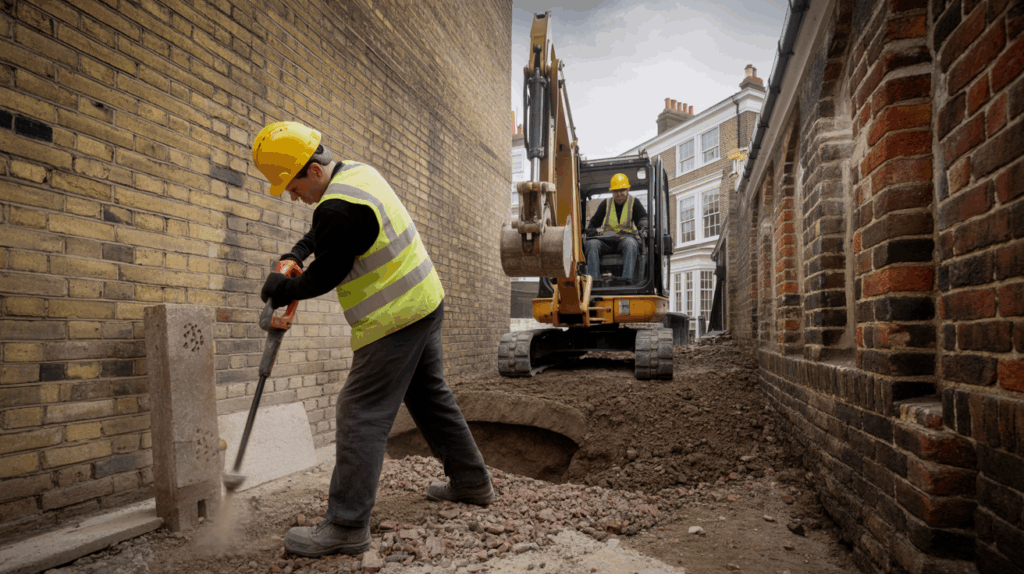I’ve watched basement extensions transform from a niche London trend into a nationwide phenomenon, and I understand why you’re considering one for your property. The potential returns are impressive—some homeowners see value increases exceeding 90%—but the reality isn’t as straightforward as the headlines suggest. Before you commit to what could be your largest home improvement investment, there’s critical information about costs, regulations, and risks that’ll determine whether this extension strategy makes financial sense for your specific situation.
Key Takeaways
- Basement extensions can increase property values by 35%-96% with average net gains of £291,699 after construction costs.
- Construction costs range £1,500-£2,000 per square meter in London, with additional expenses for waterproofing and geological testing.
- Projects face risks including subsidence from London Clay, structural failures in 12% of cases, and 6-12 months construction disruption.
- Converting existing basements typically requires no planning permission, but new excavations need full planning approval and fees.
- Monthly dewatering costs can reach £5,000-£10,000, while insurance premiums may increase by 15-40% after construction completion.
Understanding the Basement Extension Boom Across the UK
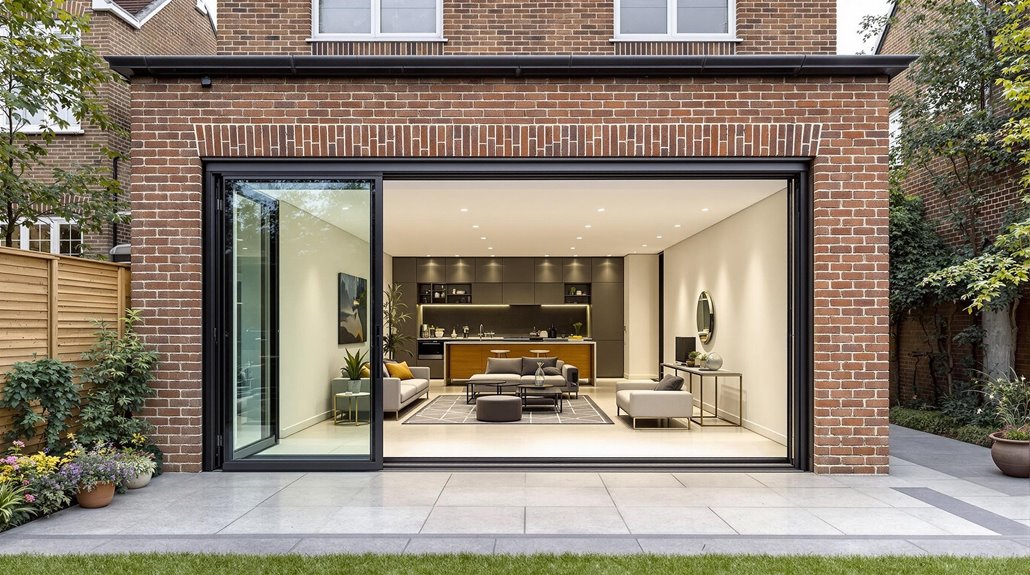
Since 2008, basement extensions have transformed from niche luxury projects into mainstream home improvement solutions across the UK. I’ve observed this dramatic shift through compelling statistics: London alone approved 7,328 basement extensions between 2008 and 2019, with peak activity in 2014 when 842 basements received approval.
You’ll find basement conversions now rival loft extensions in popularity, especially in high-value areas. London dominates this trend, capturing 75% of all UK basement applications in 2015. The numbers tell the story – regions with expensive property markets show the strongest basement application rates, while areas like the North East and Scotland account for less than 1% each. This growth has been fueled by understanding home extension costs, which allows homeowners to make informed decisions about their investments.
This boom reflects our collective response to limited urban space and soaring property values. Homeowners are discovering that basement extensions offer cost-effectiveness compared to building outward or adding additional floors, particularly in dense urban environments where space comes at a premium.
Regional Hotspots: Where Basement Conversions Are Most Popular
While basement extensions have gained momentum nationwide, the distribution of these projects reveals stark regional disparities across the UK. I’ve found that London dominates this market, accounting for 75% of all applications with 7,328 projects approved between 2008 and 2019. The capital’s 72% approval rate reflects strong demand driven by astronomical property prices and severe space constraints. Additionally, the skyrocketing demand for valuable living space has prompted many homeowners to consider this option seriously.
The South East follows as another hotspot, sharing London’s elevated property values and expansion pressures. However, you’ll discover interesting patterns elsewhere. The North West achieves a remarkable 90% approval rate, while the West Midlands follows at 87%. These regions show that moderate property prices still justify basement investments.
Conversely, the North East and Scotland represent just 0.4% and 0.6% of applications respectively, correlating directly with lower property values and reduced economic incentives. The data shows that structural impacts from basement conversions necessitate planning permission across all regions.
Planning Permission and Approval Success Rates
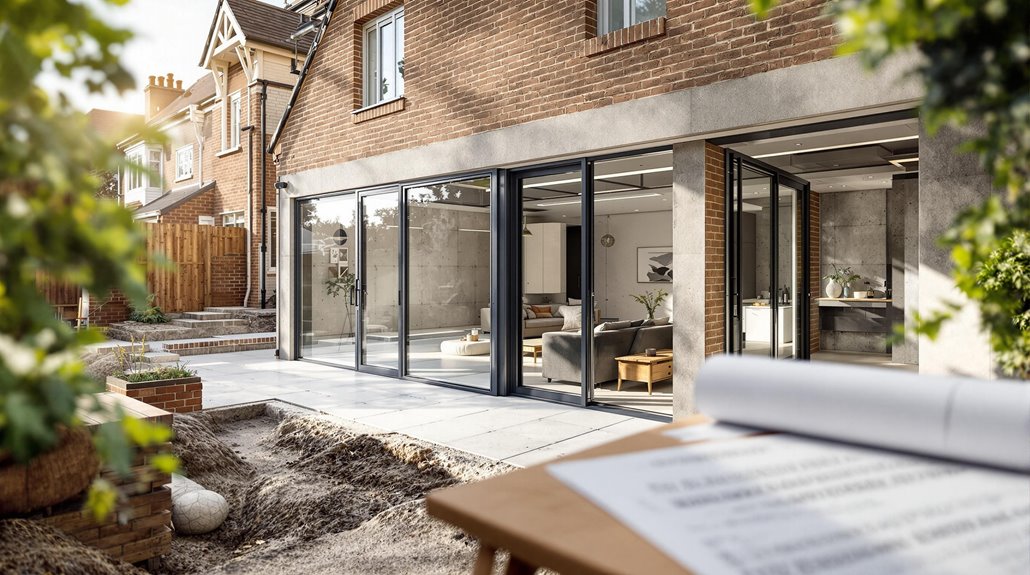
Beyond regional variations, planning permission requirements and success rates for basement extensions depend heavily on the scope and nature of your project. I’ve found that converting existing basements into living spaces typically doesn’t require permission under permitted development rights, provided you’re not making external alterations or creating separate dwellings. However, you’ll need full planning permission if you’re excavating to create a new basement, adding external features like lightwells, or your property’s in a conservation area. In some cases, your project may also need to comply with permitted development rights to avoid complications. Planning fees range from £206-£528 depending on application type, plus £200-£400 for inspections. If your application is rejected, you can lodge appeals for free within three months of the refusal decision. Success rates improve greatly when you comply with local development policies and avoid external modifications. Properties with conservation restrictions face stricter scrutiny, so I’d recommend consulting your local planning authority early in your planning process.
Financial Benefits: Property Value and Investment Returns
Securing planning permission represents just the first hurdle in your basement extension journey—the real motivation often lies in the substantial financial returns these projects deliver. I’ve analyzed London data showing basement extensions increase property values by 35%–96%, depending on your borough. In Kensington and Chelsea, you’ll see 96% value boosts, while even affordable areas like Barking deliver 35% increases.
The numbers speak volumes: average construction costs £167,955 but yield £291,699 net gains after sale. You’re looking at £459,653 average value addition—a 54% increase that dwarfs typical extensions’ 10–15% returns. Adding approximately 56 square metres of living space transforms your property’s appeal to prospective buyers who increasingly prioritize extra room in London’s cramped housing market. Furthermore, ground floor extensions offer similar advantages, making them a popular choice among homeowners. Even smaller £90,000 projects generate £60,000 net profit. Unlike surface extensions, basements maximize cost efficiency per square meter in high-demand areas where land scarcity drives premium values.
Essential Requirements: Regulations, Permits, and Professional Expertise
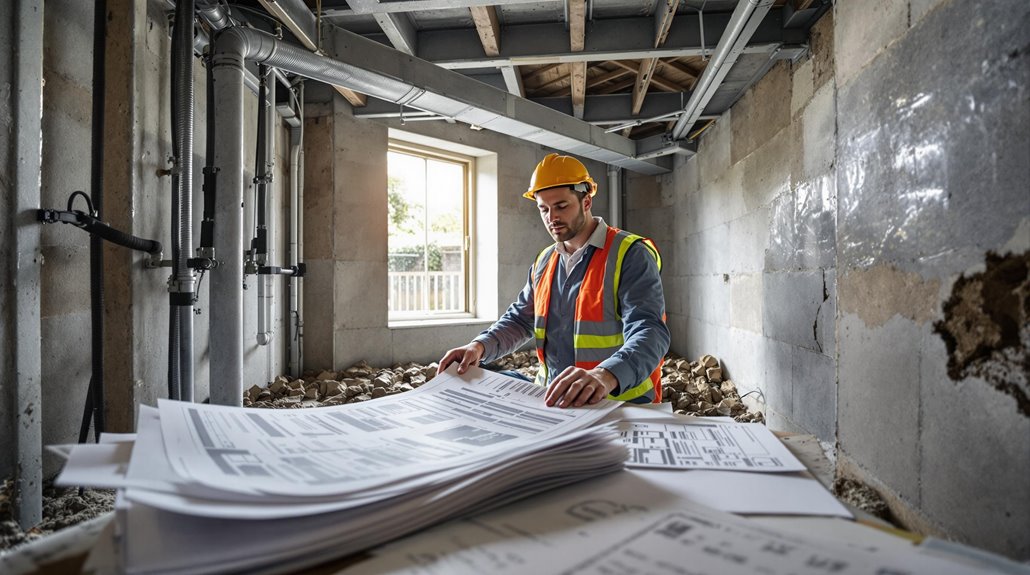
Although basement extensions offer exceptional returns, you’ll face complex regulatory requirements that demand meticulous planning and professional expertise. I’ll guide you through the essential requirements that’ll make your project successful.
You’ll need planning permission first – basements can’t exceed your property footprint plus 50% of garden area, and most London boroughs only permit single-storey basements since 2014. Additionally, it’s crucial to ensure that all changes adhere to the approved planning permissions to avoid any legal implications. Building regulations approval is mandatory regardless of planning permission, covering structural stability, energy efficiency, and safety standards.
Party wall agreements are required when excavating within 3 meters of neighbors’ properties or 6 meters at specific angles. You’ll need structural engineers for certified calculations, architects for planning coordination, and party wall surveyors for neighbor agreements. The planning application process typically takes 8 weeks from submission to decision, so factor this timeline into your project schedule. Don’t forget Construction Traffic Management Plans and acoustic assessments for compliance.
Major Drawbacks: Costs, Complexity, and Construction Challenges
While basement extensions can transform your property, the financial reality hits hard from day one. You’ll face construction costs of £1,500-£2,000 per square meter in London, plus £10,000-£15,000 for geological testing and specialist engineers. Waterproofing alone consumes 20-30% of your budget, while insurance premiums jump 15-40% afterward. In contrast, garage extensions(the ability to maximize unused space) can be a more affordable alternative for homeowners looking to expand their living area without incurring the high costs associated with basement projects.
London Clay presents serious challenges—its shrinkage potential causes subsidence during excavation, and water fluctuations trigger structural cracks in 23% of projects. You’ll need specialized piling for fossil-rich Bagshot Formation layers.
Construction disrupts your life completely. Projects take 6-12 months, generating 200-400 truckloads of soil requiring traffic management. Dewatering systems cost £5,000-£10,000 monthly in energy alone. Noise from piling breaches limits on 40% of urban sites, while structural failures delay 12% of projects. Heritage properties face even greater complexity due to older foundations requiring extensive structural assessments before any excavation work begins.
Making the Right Decision for Your Property and Circumstances
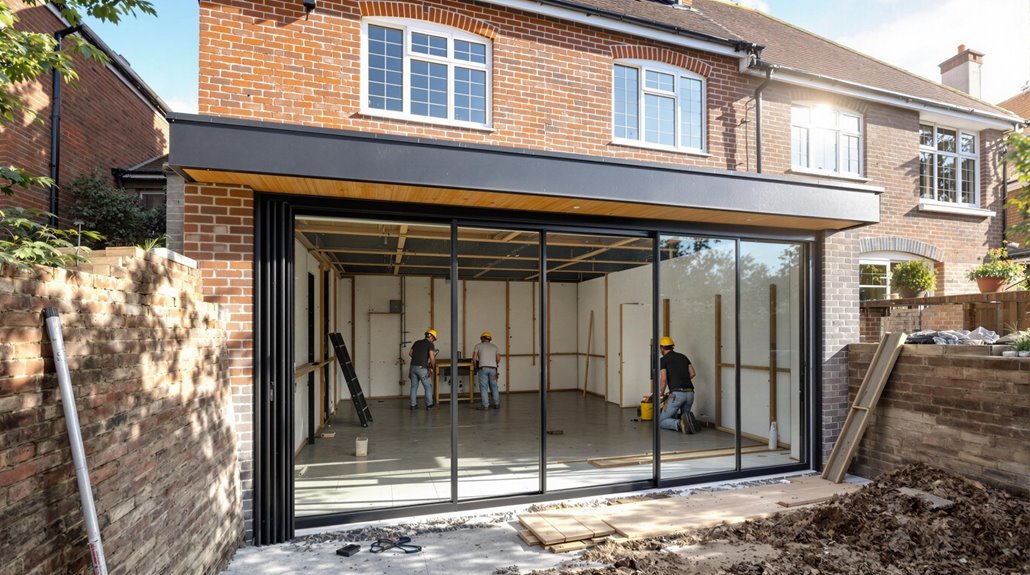
Despite the significant challenges outlined above, basement extensions can deliver exceptional returns when circumstances align correctly. I’d recommend starting with a professional assessment of your property’s potential value increase. In London’s high-value boroughs like Kensington and Chelsea, you’re looking at up to 96% property value increases, while even affordable areas like Barking and Dagenham see 35% gains. Additionally, converting unused spaces like basements can enhance home functionality and increase livable area.
Consider your specific circumstances carefully. If you’re in a space-poor, expensive location, the math typically works in your favour. The average London basement costs £167,955 but adds £459,653 to sale price – that’s a net gain of £291,699. Be prepared for the construction phase which requires a minimum 18 weeks to complete.
Focus on quality execution: guarantee adequate natural light, proper headroom, and well-proportioned staircases. These design elements directly impact your financial return and determine whether you’ll join the success stories.
Conclusion
I’ve walked you through the key factors surrounding basement extensions—from planning hurdles to property value gains. You’ll need to weigh the substantial costs against potential returns, ensuring you’ve got proper permits and professional expertise. Don’t underestimate the complexity and disruption involved. If you’re in a high-value area with space constraints, it’s likely worth pursuing. Otherwise, consider simpler alternatives. Make your decision based on your specific circumstances and budget capacity.
References
- https://www.christopher-david.co.uk/basement-extension-guide-2025/
- https://www.dhaplanning.co.uk/knowledge/basement-extensions-in-london-dhas-advice
- https://pocketmags.com/build-it-magazine/may-2025/articles/the-case-for-basements-in-new-homes
- https://www.propertywire.com/news/uk/basement-extensions-becoming-popular-uk/
- https://geosmartinfo.co.uk/2017/03/the-hidden-risk-with-basement-conversions/
- https://www.foxtons.co.uk/discover/2017/02/75-of-all-uk-basement-conversions-are-in-london
- https://windsorpatania.com/learn/conversions-extensions/london-basement-conversion/
- https://www.kingsleynapley.co.uk/insights/blogs/real-estate-law-blog/going-underground-the-pros-and-cons-of-basement-conversions
- https://hoa.org.uk/advice/guides-for-homeowners/i-am-improving/cost-of-planning-permission/
- https://www.self-build.co.uk/planning-hidden-costs/

